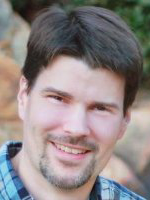
Graduate Student Alumni Spotlight
Computer Science MS
 Student Name: Mark Mullins
Student Name: Mark Mullins
Program: Master's in Computer Science
Graduated: 2014
Employer: General Dynamics
Position: Engineer
What attracted you to this field?
Growing up, I enjoyed challenges involving logic and puzzles. I also found my best expressions often came via written communication. With those inclinations, software design and development was a natural attraction.
Why did you choose UT Tyler?
Location and novelty. Living in East Texas and having attended other schools in the area, I chose UT Tyler to gain fresh perspectives on computer science topics under new professors.
What did you like most about UT Tyler?
The location, dedicated faculty, and facilitation of commuting students.
What are your career aspirations?
I'd like to eventually become a senior software engineer responsible for estimating, gathering requirements for, designing, developing, testing, and deploying embedded system software solutions.
What's your work experience?
I've worked for more than nine years as a software engineer. I've spent time on projects to design and develop software for satellite antenna controllers and receivers, audio modulators for communication systems analyzers, and automated servicing software for land mobile radios, among others. Along the way, I've been mentored by several engineering colleagues (and mentored a few younger engineers/interns), interacted with many internal and external customers in testing and troubleshooting products, and generally had a good time doing what I do.
Do you have any advice to pass along to other students interested in this program?
The following isn't original with me but I've found it helpful. When selecting a technical career, keep in mind several general technical career classifications. First, there's the scientist. Scientists perform research to discover new things (laws, theories, etc.) about how the universe works. Projects they work on can take years, sometimes even a decade or so, to complete. Careers as a scientist are relatively scarce.
Second, there are engineers. Engineers take what scientists have discovered about the universe and apply it to practical problems. For example, an engineer might consider factors like needed RF power output, expected ambient temperature, and battery capacity when designing a new radio. Engineering projects typically take months and sometimes years to complete. There are far more engineering careers available than scientific careers.
Finally, there are technicians. Technicians operate and maintain the products engineers produce. For example, a technician might solder printed circuit boards. Although engineers frequently perform similar tasks as well, that's not their primary function. Technicians usually spend hours, perhaps days in some cases, on their tasks. As might be expected, careers as a technician are relatively abundant. Decide which classification best fits your skills and abilities and then go be the best you can be at it.
Find out more about our Computer Science MS




